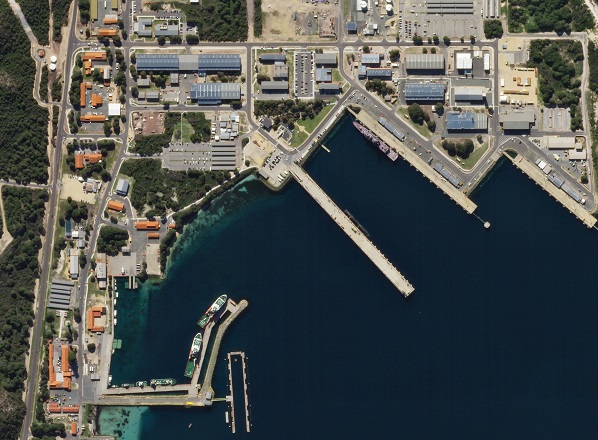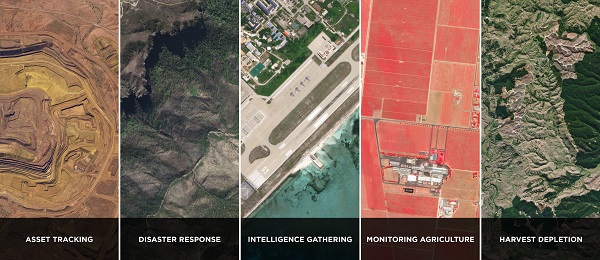
50 cm SkySat imagery of the HMAS Stirling, Garden Island, Western Australia, on July 10, 2020. © 2020, Planet Labs Inc. All Rights Reserved.
Planet designs, builds and operates the largest constellation of imaging satellites in history. Our mission is to image the entire Earth every day and make global change visible, accessible and actionable.
Planet embodies the philosophy of agile aerospace, a concept that advocates for the use of low-cost, lean electronics to innovate more rapidly in the fields of aerospace and aviation.
In six years, we have successfully deployed 351 satellites—10 times that of any competitor, collecting over 250 million square kilometres of imagery daily, with an unprecedented dataset of on average 1,200 images of every location on Earth’s landmass.
Planet currently operates two constellations. The satellites that comprise each constellation have unique spatial, temporal and radiometric resolutions, allowing us to capture Earth’s activities from multiple perspectives and dimensions. Our Dove satellites are small— about the size of a shoebox, weighing approximately five kilograms– which is many orders of magnitude smaller than traditional satellites. Doves are typically launched into space in large batches, what we call “flocks.”

Download our latest use cases planet.com/company/resources/
The SkySat constellation consists of 18 satellites. SkySats can be tasked to image any point on Earth in high resolution and at sub-daily frequency. They can also capture stereo imagery and video footage for up to 90 seconds. SkySats, unlike Doves, have a propulsion system that allows Planet to maintain them at a desired altitude and optimise global coverage. By operating these diverse assets in both morning and afternoon crossing times, Planet provides unprecedented Earth observation data on a global scale.
In addition to creating a unique dataset of near-daily satellite imagery, Planet is revolutionising the way geospatial imagery is processed, analysed, distributed and accessed.
We are making satellite data available nearly instantly via web-based APIs and an online catalogue. The platform is capable of delivering terabytes of fresh data every day and uses machine learning analytics to yield powerful insights that drive business decisions.
Planet Tasking: On demand high resolution intelligence
The accelerating pace of global change demands that organisations have rapid access to fresh and accurate information. But the traditional satellite tasking model hasn’t evolved to deliver high-resolution imagery reliably and quickly, limiting intelligence gathering and hampering decision-making. Planet Tasking empowers organisations with global access to high-frequency, very-high-resolution (50 cm) imagery on their own terms, giving them real-time intelligence to proactively identify blind spots, anticipate events, and have confidence in the next mission-critical decision.
 Higher resolution 50 cm imagery
Higher resolution 50 cm imagery
Planet has successfully lowered the SkySat constellation to enhance the spatial resolution of our SkySat imagery from 80 cm to 50 cm for our ortho product. This improvement enables customers to get a more precise view of changing conditions on the ground and adds more granular context to decision-making. This is particularly important for commercial and government mapping use cases, where seeing smaller features like road surface markings are key.
Tasking Dashboard
At Planet we want to democratise access to our assets, and we hear from all our users a desire to have simpler and faster workflows. The Tasking Dashboard is a new user interface that allows customers to request SkySat collections, while our new API provides efficient, automated access. Instead of spending precious time going back and forth with a human rep, with the Tasking Dashboard and API, customers can autonomously submit, modify and cancel SkySat imagery requests. This enables visibility into the end-to-end experience, from order to fulfilment, so expectations can be managed with analysts and teams.
Rapid revisit, with up to 12x revisit capabilities
This unprecedented capability will provide more rapid response to global events and enable imaging at times of the day previously unseen by satellites. Rapid revisit is a qualitative term used in satellite monitoring to describe the ability of the system to make repeated image captures separated by short time intervals. This implies both that the constellation can respond at short notice to collect a target without waiting days for the satellites to pass overhead, and that frequent collects can be made of a target over a given time of interest.
Diverse Use Cases
With 18 satellites in operation, the SkySat constellation is unmatched in size. Multiple daily passes allow decision cycles to accelerate with accurate, real-time views of what’s happening as conditions evolve. Planet Tasking empowers intelligence across a range of use cases, from intelligence gathering to disaster management to mapping remote corners of the world.
At Planet, we continue to apply our agile aerospace approach to our SkySat offerings to support our growing customer base, from federal and civil governments to commercial forestry to energy and more. These product advances are key components of our overall mission to democratise access to satellite imagery, providing critical intelligence to customers and organisations when they need it most.
See change. Change the world.
Learn how Planet can help you turn data to actionable insights at go.planet.com/getintouch. You can also visit www.planet.com and follow us on Twitter at @planetlabs.
Information provided by Planet.








Comments are closed.